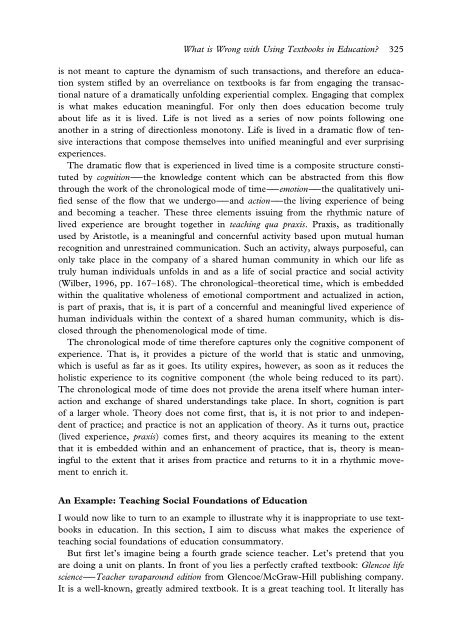Oral 2013 TextBooks
You also want an ePaper? Increase the reach of your titles
YUMPU automatically turns print PDFs into web optimized ePapers that Google loves.
What is Wrong with Using Textbooks in Education? 325<br />
is not meant to capture the dynamism of such transactions, and therefore an education<br />
system stifled by an overreliance on textbooks is far from engaging the transactional<br />
nature of a dramatically unfolding experiential complex. Engaging that complex<br />
is what makes education meaningful. For only then does education become truly<br />
about life as it is lived. Life is not lived as a series of now points following one<br />
another in a string of directionless monotony. Life is lived in a dramatic flow of tensive<br />
interactions that compose themselves into unified meaningful and ever surprising<br />
experiences.<br />
The dramatic flow that is experienced in lived time is a composite structure constituted<br />
by cognition——the knowledge content which can be abstracted from this flow<br />
through the work of the chronological mode of time——emotion——the qualitatively unified<br />
sense of the flow that we undergo——and action——the living experience of being<br />
and becoming a teacher. These three elements issuing from the rhythmic nature of<br />
lived experience are brought together in teaching qua praxis. Praxis, as traditionally<br />
used by Aristotle, is a meaningful and concernful activity based upon mutual human<br />
recognition and unrestrained communication. Such an activity, always purposeful, can<br />
only take place in the company of a shared human community in which our life as<br />
truly human individuals unfolds in and as a life of social practice and social activity<br />
(Wilber, 1996, pp. 167–168). The chronological–theoretical time, which is embedded<br />
within the qualitative wholeness of emotional comportment and actualized in action,<br />
is part of praxis, that is, it is part of a concernful and meaningful lived experience of<br />
human individuals within the context of a shared human community, which is disclosed<br />
through the phenomenological mode of time.<br />
The chronological mode of time therefore captures only the cognitive component of<br />
experience. That is, it provides a picture of the world that is static and unmoving,<br />
which is useful as far as it goes. Its utility expires, however, as soon as it reduces the<br />
holistic experience to its cognitive component (the whole being reduced to its part).<br />
The chronological mode of time does not provide the arena itself where human interaction<br />
and exchange of shared understandings take place. In short, cognition is part<br />
of a larger whole. Theory does not come first, that is, it is not prior to and independent<br />
of practice; and practice is not an application of theory. As it turns out, practice<br />
(lived experience, praxis) comes first, and theory acquires its meaning to the extent<br />
that it is embedded within and an enhancement of practice, that is, theory is meaningful<br />
to the extent that it arises from practice and returns to it in a rhythmic movement<br />
to enrich it.<br />
An Example: Teaching Social Foundations of Education<br />
I would now like to turn to an example to illustrate why it is inappropriate to use textbooks<br />
in education. In this section, I aim to discuss what makes the experience of<br />
teaching social foundations of education consummatory.<br />
But first let’s imagine being a fourth grade science teacher. Let’s pretend that you<br />
are doing a unit on plants. In front of you lies a perfectly crafted textbook: Glencoe life<br />
science——Teacher wraparound edition from Glencoe/McGraw-Hill publishing company.<br />
It is a well-known, greatly admired textbook. It is a great teaching tool. It literally has


